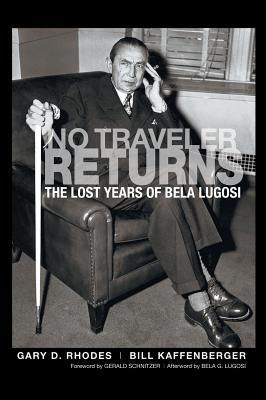"Gary Rhodes and Bill Kaffenberger have added the final chapter to Bela Lugosi's career, combining fascinating unknown details of his film and stage activities with post-WWII film history. Superbly researched and written as an engrossing story of an actor's struggle against professional decline. A must-read!"
- Robert Cremer, author of Lugosi: The Man Behind the Cape
(Henry Regnery, 1976).
"Gary Rhodes represents that elusive Gold Standard in narrative research into the full depth and breadth of Bela Lugosi's complicated career. Rhodes' devotion to the banishment of myth, and to its replacement with frank and humanizing truth, has provided a wealth of historical storytelling that, in turn, renders the actor's known body of work all the more fascinating and comprehensible. Just when I catch myself believing I know all there is to be known about Lugosi -- along comes Gary Rhodes and Bill Kaffenberger with a fresh brace of revelations. The process advances immeasurably in No Traveler Returns: The Lost Years of Bela Lugosi."
- Michael H. Price, coauthor of the Forgotten Horrors series.
In No Traveler Returns, Bela Lugosi scholar extraordinaire Gary D. Rhodes and Bill
Kaffenberger provide a fascinating time travel journey back to the late 1940s/early 1950s, when Lugosi - largely out of favor in Hollywood - embarked on a Gypsy-like existence of vaudeville, summer stock, and magic shows. While many historians have considered this era a limbo in Lugosi's career, with precious few facts unearthed, Rhodes and Kaffenberger take the reader along for a wide-eyed ride as Bela performs in a nightclub so notorious that armed guards keep watch on the roof, dresses as Dracula in a magic show where he and a gorilla (a man in a suit) play football with the guillotined head of a woman (a dummy), and races from one stock engagement to another without ever missing a cue. Never in his American career was Bela so busy, and never did his light shine so brightly as he valiantly troupes to support his family, dominate age and illness, and please his audiences. It's a fastidiously researched education in the show business world of the time - and a stirring tribute to the charm, brilliance and inexhaustible professionalism of the star who was Dracula.
- Gregory William Mank, author of Bela Lugosi and Boris Karloff: The
Expanded Story of a Haunting Collaboration (McFarland, 2009).

No Traveler Returns: The Lost Years of Bela Lugosi (hardback)
"Gary Rhodes and Bill Kaffenberger have added the final chapter to Bela Lugosi's career, combining fascinating unknown details of his film and stage activities with post-WWII film history. Superbly researched and written as an engrossing story of an actor's struggle against professional decline. A must-read!"
- Robert Cremer, author of Lugosi: The Man Behind the Cape
(Henry Regnery, 1976).
"Gary Rhodes represents that elusive Gold Standard in narrative research into the full depth and breadth of Bela Lugosi's complicated career. Rhodes' devotion to the banishment of myth, and to its replacement with frank and humanizing truth, has provided a wealth of historical storytelling that, in turn, renders the actor's known body of work all the more fascinating and comprehensible. Just when I catch myself believing I know all there is to be known about Lugosi -- along comes Gary Rhodes and Bill Kaffenberger with a fresh brace of revelations. The process advances immeasurably in No Traveler Returns: The Lost Years of Bela Lugosi."
- Michael H. Price, coauthor of the Forgotten Horrors series.
In No Traveler Returns, Bela Lugosi scholar extraordinaire Gary D. Rhodes and Bill
Kaffenberger provide a fascinating time travel journey back to the late 1940s/early 1950s, when Lugosi - largely out of favor in Hollywood - embarked on a Gypsy-like existence of vaudeville, summer stock, and magic shows. While many historians have considered this era a limbo in Lugosi's career, with precious few facts unearthed, Rhodes and Kaffenberger take the reader along for a wide-eyed ride as Bela performs in a nightclub so notorious that armed guards keep watch on the roof, dresses as Dracula in a magic show where he and a gorilla (a man in a suit) play football with the guillotined head of a woman (a dummy), and races from one stock engagement to another without ever missing a cue. Never in his American career was Bela so busy, and never did his light shine so brightly as he valiantly troupes to support his family, dominate age and illness, and please his audiences. It's a fastidiously researched education in the show business world of the time - and a stirring tribute to the charm, brilliance and inexhaustible professionalism of the star who was Dracula.
- Gregory William Mank, author of Bela Lugosi and Boris Karloff: The
Expanded Story of a Haunting Collaboration (McFarland, 2009).